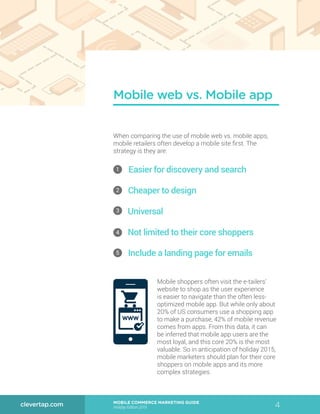Is Mobile Marketing The Future Of E-Commerce? A Comprehensive Guide

Table of Contents
The Rise of Mobile Commerce (m-commerce): Unpacking the Numbers
The growth of mobile commerce (m-commerce) is nothing short of phenomenal. Market research consistently reveals a rapid increase in mobile shopping, with projections indicating continued exponential growth in the coming years. This isn't just about quantity; it's about a fundamental shift in how consumers engage with brands and make purchasing decisions.
- Statistics: [Insert relevant statistics on m-commerce growth, market share by region, and projected future growth from reputable sources like Statista or eMarketer. For example: "Global m-commerce sales are projected to reach X billion dollars by Y year."]
- Demographics: Mobile shoppers represent a diverse demographic, encompassing various age groups, income levels, and geographic locations. However, younger generations (Millennials and Gen Z) are particularly significant drivers of m-commerce growth.
- Reasons for the Rise: The convenience and accessibility of mobile shopping are key factors driving its popularity. Consumers can shop anytime, anywhere, using their smartphones. Other reasons include:
- Ease of comparison shopping
- Personalized recommendations and offers
- Seamless payment options
- Access to customer reviews and ratings
- Success Stories:
- [Example: A company that successfully leveraged mobile marketing to boost sales. Include specific details on their strategies.]
- [Example: Another company with a compelling mobile-first success story.]
Key Strategies for Effective Mobile Marketing in E-commerce
To thrive in the mobile-first era, e-commerce businesses must adopt a comprehensive mobile marketing strategy. This encompasses several key areas:
Mobile-Optimized Website Design
Your website is your digital storefront. A poorly designed mobile website will drive customers away. Prioritize:
- Responsive Design: Ensure your website adapts seamlessly to different screen sizes and devices.
- Page Speed Optimization: Slow loading times are a major turn-off. Optimize images, code, and leverage caching.
- Mobile-First Indexing: Google prioritizes mobile versions in its search results. Optimize your mobile site accordingly.
- Intuitive Navigation: Make it easy for users to find what they need with clear navigation menus and a logical site structure.
App Marketing and Engagement
A dedicated e-commerce app can enhance customer loyalty and engagement.
- App Store Optimization (ASO): Optimize your app listing with relevant keywords, compelling descriptions, and high-quality screenshots.
- In-App Marketing: Utilize push notifications for timely promotions and personalized offers.
- Retention Strategies: Implement loyalty programs, personalized recommendations, and engaging content to keep users coming back.
Leveraging Mobile Advertising
Mobile advertising provides highly targeted reach.
- Types of Mobile Ads: Explore in-app advertising, social media ads (Facebook, Instagram), and search ads (Google Ads).
- Effective Targeting: Utilize demographic and behavioral targeting to reach the right audience.
- ROI Measurement: Track key metrics like click-through rates (CTR), conversion rates, and cost per acquisition (CPA) to optimize campaigns.
- Creative Best Practices: Design visually appealing and engaging mobile ad creatives.
SMS Marketing and Mobile Messaging
SMS marketing offers a direct and personal way to connect with customers.
- Strategy Development: Define clear goals and target audience for your SMS campaigns.
- Promotional Use: Send timely promotions, discounts, and special offers.
- Legal Compliance: Adhere to all relevant regulations regarding SMS marketing.
- Channel Integration: Integrate SMS marketing with your email and social media strategies.
Mobile Marketing Analytics and Optimization
Data-driven decision-making is critical for mobile marketing success.
- Key Metrics: Track conversion rates, click-through rates, bounce rates, and other relevant metrics.
- Analytics Tools: Utilize tools like Google Analytics to understand user behavior and campaign performance.
- A/B Testing: Conduct A/B tests to optimize your mobile website, app, and advertising campaigns.
- Data-Driven Optimization: Continuously analyze your data to identify areas for improvement and refine your strategies.
Conclusion: Embracing the Mobile Future of E-commerce
Mobile marketing isn't just a trend; it's the foundation for future e-commerce success. By implementing a comprehensive strategy that incorporates mobile-optimized websites, engaging apps, targeted mobile advertising, effective SMS marketing, and data-driven optimization, you can unlock the full potential of your e-commerce business. Don't fall behind! Invest in a robust mobile marketing strategy today to unlock the full potential of your e-commerce business. Learn more about effective mobile marketing techniques now!

Featured Posts
-
 Dimereis Sxeseis Kyproy Oyggarias Syzitiseis Kompo Sigiarto Gia Kypriako Kai Proedria Ee
May 19, 2025
Dimereis Sxeseis Kyproy Oyggarias Syzitiseis Kompo Sigiarto Gia Kypriako Kai Proedria Ee
May 19, 2025 -
 Londoners Take Legal Action To Save Park From Music Festivals
May 19, 2025
Londoners Take Legal Action To Save Park From Music Festivals
May 19, 2025 -
 Tuerk Devletlerinin Kktc Karari 12 Milyon Avroluk Destegin Ayrintilari
May 19, 2025
Tuerk Devletlerinin Kktc Karari 12 Milyon Avroluk Destegin Ayrintilari
May 19, 2025 -
 Nyt Connections Answers Puzzle 670 April 11th
May 19, 2025
Nyt Connections Answers Puzzle 670 April 11th
May 19, 2025 -
 Legal Victory Halts Londons Popular Festivals Wide Awake Mighty Hoopla And The Cultural Fallout
May 19, 2025
Legal Victory Halts Londons Popular Festivals Wide Awake Mighty Hoopla And The Cultural Fallout
May 19, 2025
